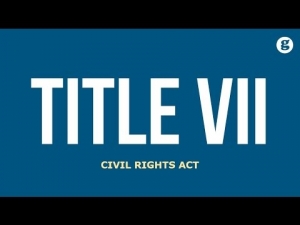The Ninth Circuit Permits a Title VII Claim Based On Offensive Music in the Work Place
Reprinted from the April 20th edition of The Legal Intelligencer. (c) 2023 ALM Media Properties. Further duplication without permission is prohibited.
In Sharp v. S&S Activewear, LLC, the United States Court of Appeals for the Ninth Circuit tackled the difficult issue of when a generally toxic workplace becomes a hostile environment under Title VII. 42 U.S.C. § 2000e-2(a)(1). The Ninth Circuit’s conclusion that employees’ allegations regarding playing offensive music in the workplace were sufficient to state a claim for a hostile work environment under Title VII relied on recent Supreme Court precedent, in Bostock v. Clayton County, 140 S. Ct. 1731 (2020); and Oncale v. Sundowner Offshore Servs, 523 U.S. 75 (1998).
Supreme Court Expands Title VII Protections to Prohibit Discrimination on the Basis of Sexual Orientation and Gender Identification
Reprinted with permission from the June 19th edition of The Legal Intelligencer. (c) 2020 ALM Media Properties. Further duplication without permission is prohibited.
The Supreme Court of the United States held in Bostock v. Clayton County, Georgia, 590 U.S. ___ (US 2020) that Title VII’s prohibition against discrimination on the basis of sex also bars discrimination on the basis of sexual orientation and gender identity. The Court’s opinion relies on the text of the statute, rejecting arguments from employers regarding the failure to specifically include gender identity or sexual orientation in the statue. The Supreme Court’s decision in Bostock is historic – it expands the protections of Title VII to sexual orientation and gender identity, protections previously denied. The Court’s ruling requires employers to update and modernize their policies and procedures, hiring practices, training and workplace culture.
Supreme Court Finds Title VII’S Requirement to File a Charge of Discrimination is not Jurisdictional
Reprinted with permission from the June 21st edition of The Legal Intelligencer. (c) 2019 ALM Media Properties. Further duplication without permission is prohibited.
In Fort Bend County v. Davis, 587 U.S. ___ (2019), the Court held that the requirement that a plaintiff in an employment discrimination case brought under Title VII, 42 U.S.C. § 2000e, et seq, file a charge of discrimination with the Equal Employment Opportunity Commission (“EEOC”) prior to filing a complaint in court is a procedural and not a jurisdiction requirement. Therefore, an employer’s failure to assert the absence of an appropriate charge of discrimination in a motion to dismiss results in a waiver of the defense. The Supreme Court’s decision resolves a split in the circuits regarding whether the requirement is jurisdictional, and highlighted the importance of the charge of discrimination and the motion to dismiss in employment discrimination cases.
Employment Law Lessons from Harvey Weinstein
Harvey Weinstein’s conduct is irresponsible, atrocious and potentially criminal, but that’s not the point of this blog. Instead, I would like to take the opportunity presented by Weinstein’s case (and the many others in the news this year) to talk about reporting and remediating workplace harassment.
Weinstein is the next in a line of prominent men accused of decades of harassment. It appears that at places like Fox and Miramax, and now Amazon, harassment by the boss was a feature of workplace culture. How did responsible employers allow this to continue? Did the women not complain? Did the employer bury the accusation? Didn’t anyone know? There is some evidence that the answer to all of these questions is yes: the women felt that they could not complain, the employer buried the accusations with financial settlements, and many knew and did not raise any red flags out of fear or intimidation.
The other common theme in these cases is the kind of harassment that took place: abuse of position, arrogance about complaints, “quid pro quo” promises, and intimidation.
Employers should consider their policies and practices to ensure a workplace free from this conduct. Serial harassers poison the culture of the workplace and hurt the bottom line. A recent article in the Wall Street Journalnoted the impact on the workplace of “rude” employees. Imagine the impact of intimidating, harassing executives who abuse their power? If employers have a serial harasser in a leadership position, it is time to face the music and address the behavior.
Employees should have an easy means of complaining. Policies should allow employees to “go around” the harassing superior in order to make the complaint, and the harasser should not be included in decision making regarding the complaint. Employers should avoid overly formal complaint procedures or reliance on form over substance. Employers should conduct professional, confidential investigations, and farm the investigation out to a third party if necessary.
It is important to note that settlements are not a license to keep a harasser employed. The employer still has knowledge of the harasser’s bad behavior, and steps should be taken to avoid repeated incidents. Those steps might include termination of important employees.
A common theme in these high-profile cases is that the conduct started (and thus the culture was created) in a “different time” when these workplace protections were not in place. That’s absurd. Title VII became law in 1964, and employers should pride themselves on operating a modern workplace, compliant with laws that have been on the books for decades.
So, how modern is your workplace? Do you have a serial harasser? Are you burying complaints to protect an executive? Do your employees have a safe, easy way to make complaints to an independent person? AMM can help employer develop a common sense policy that protects your business and your employees.























